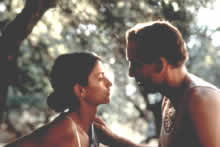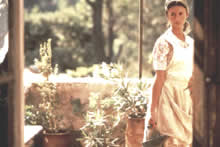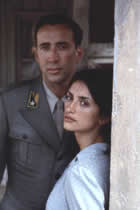
A deeper way of answering the question would be to say that Mandras' evolution as a character meant exploring ways in which that character worked and there some decisions that came much later. To have Mandras find Corelli at the execution point, which as you know is Velisarios, that decision was made very late on. I don't want to go on about these issues but the thing that interested me was that Corelli came to the island with a set of values, he doesn't feel like a soldier but by the other end of the story he is the complete opposite of that. He feels that he has subsumed the rights of another man and the fact that Mandras should save him, not for entirely altruistic reasons, that seemed a really powerful contrast at that moment. It was a way of expounding certain themes and ideas in the book in a dramatic context, Louis' characters work in a different way because he hasn't structured the book as a dramatic narrative, although packed with dramatic incident it's a lot more discursive.
Do you not think that worked against you in that it takes so much of the pressure off Pelagia, you demand a lot less from her?
JM - That's a fair point in a way. I think that was one of the things that was particularly difficult about adapting the book into the film. You have such a long time frame in the book and an enormous amount of very powerful incidents happening on top of one another at the end of the story, whereas very little happens at the beginning. In all honesty, my original intention was that she lost her father and I changed my mind at the first read through in Cephallonia.
Why?
JM - Because the film would not have survived it, the film would have had to end at that point.
If Iannis doesn't die, then why keep the earthquake?
JM - Well, I have to confess that that was a bias of my own, the earthquake to me was an absolutely key incident and a dangerous one because it has no causality. There was something about the island, something about nature shrugging its shoulders that felt extraordinarily part of the magical realist world that Louis created. Also the idea of healing and regeneration were themes that I felt were very important in the book - the father and daughter as doctors and so on - that survival in the earthquake felt really important. I was completely committed to that I'm afraid (laughs) and I worked backwards from there.
JM - The other thing about the earthquake was that it allowed a new landscape to be created the other side of the film. The book is not about destruction; it's actually about continuation, it's about life and the role of love in life despite gazing unblinkingly and unflinchingly at war. You can't pile an enormous amount of destruction onto the end of a film like that and then expect that catharsis to arrive instantly; it's a tonal, musical thing.

How do you think those who've read the book will react to the adaptation?
KL - On the current evidence, very well and I think people are sophisticated about this now; they know that a 430 page novel can't be adapted blow for blow in a movie. We only ever really attempted, as Shawn was saying, to get to the core of this and to be truthful to the spirit of the characters and the essential thematic concerns of the novel.
JM - I think that if we've got Louis' mother on our side…
KL - …and his girlfriend,
JM - I think the mother is the most important one for me! (laughs) It's not a book that you cannot tread in the footsteps of in any literal way because you wouldn't end up with a viable film, you have to make more radical decisions than that.
What does Louis think of the film?
KL - Louis has seen it five times so he must be more than tolerating it. (laughter)
I read somewhere that Weber was supposed to commit suicide after the execution scene, why did you not follow up that part of the story?
JM - That was an aspect of the novel that Louis felt he'd left slightly unwritten, as you know he wrote another chapter about Weber; that was one of the good things about that book, you want to keep following all of the characters to the limits of their experience. I felt that there was some unfinished business between Weber and Corelli about a possible development in the story, in the end I let it go because when that man drives off into Hell after the firing squad his story is ended really. Apropos of what I was saying earlier about the compression of the number of scenes of really heavyweight impact, I was in an odd situation in that I stated the scenes I really wanted to explore but I was exploring them in about five months rather than two years.
Do you think your action sequences owe anything to those of Saving Private Ryan?
JM - Well they definitely raised the bar but I don't think it was them alone, I shared a camera man with Thin Red Line which had some pretty cracking battle sequences of it's own. Definitely, that was a sequence that will go down in cinematic history; it was less about choreography and more about emotional experience, that's what made it so extraordinary. It was incredibly skilled at every level, especially with the sound and that's what raised it to such a height. It felt thrown away and that's what is so admirable about it, I didn't watch it while I was making the film but it is there in your head definitely.
Many saw the role of Corelli as someone smaller, what was idea behind casting Nick Cage?
JM - The one element that was already in place when I came onto the project was Nick, he was committed already but I'd love to think that I'd had the imagination to cast him.
KL - You are talking about two different things to be honest. One is the reality of movie financing and if you are going to make a film which, like this one, cost $50m then you are going to need a star whether American, Australian or British. It was a pretty short list. The way I saw it was with the array of characteristics that Corelli needed to display; we needed someone that was front footed, humorous, just the right side of goofy at times and romantic, also someone capable of the transition into the darker section of the film. That's a pretty short list to be honest.
Did you have anyone in your mind for the part Shawn?
SS - Never, I can't think of anybody else who can play that part as well as Nick, he had such beautiful hands and eyes! (laughter) I don't know how other writers work but I rarely have anyone specific in mind, I have a general emotional image - I wasn't sitting there writing for Tom Cruise. (laughter)
 Did you have any problems with accommodation while on location?
Did you have any problems with accommodation while on location?
KL - We did have problems with accommodation. In fact, I kept telling everyone in the early planning of this film that booking the hotels was absolutely the most crucial thing we had to do and everybody looked at me, like, "Don’t be silly, you can always get hotel rooms". And it’s just not true actually because the island completely depends upon its tourist economy; most hotels do deals with tour operators and most operators are back every year and they’re there for the long haul. We were in for one summer and even if we paid the hotels 10% more they’d rather have their 5 and 10 year relationship with the tour operators. So it was a factor, but to be honest we did choose the side of the island, because it suited our purposes perfectly, that is probably the least touristy.
Most people go to the other side and we got a lot of curiosity from visiting tourists when we were there and I hope that tourists who go back there inspired by the film treat it with the same respect that I think we did.
JM - I think the island as a whole will be delighted. I mean, they are delighted with what the book’s done for them in terms of tourist attractions in Greece. Essentially, the tourism will always be controlled by the availability of hotels and flights, it’s not over developed at all. There’s one strip on the south of the island that's very well developed for tourism but the rest of it isn’t at all.
How was Louis involved in the film? Did he take a back seat and let you get on with it or did he have an active role?
SS - He sold the option of his book to Kevin and then Working Title and I think he may have had the option to write the screenplay.
KL - It wasn’t really an option. The very first time I took him to lunch to try and persuade him to give me the rights I asked him, as I often do when I’m meeting novelists in these situations, whether he would have been interested in working on a screenplay. He was very adamant from the word go that he wasn’t a screenwriter and wouldn’t know how to do it and secondly, he’d rather be writing more novels than re-writing novels he’d already written.
JM - He came to the island for about 2 weeks while we were filming.
KL - We felt we had his support and we felt we could call on him if we needed him. It was very nice when he came to the island because it was a kind of culmination of a long process for all of us.
Have you seen any of de Bernieres' South American trilogy in the process?
KL - I’ve read them. They’ve all been optioned at one time or another by film producers but as yet none have been made, there’s a couple of scripts around town. I think they’ve got slightly more of the magic realist Louis de Bernieres than Corelli has and therefore they’re quite hard to do. Iain Softley was developing one for a while and there's some reasonably good scripts around the place but films set in South America have a difficult time of it for some illogical reason. I'm sure they'll get made one day.